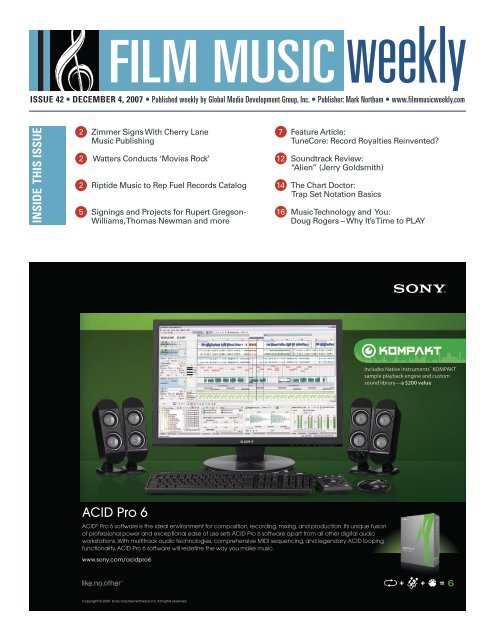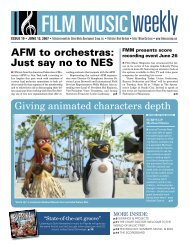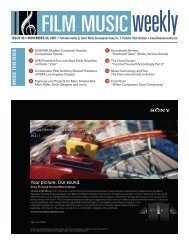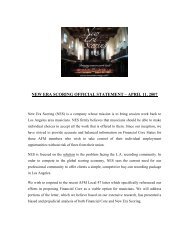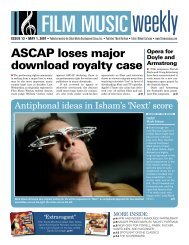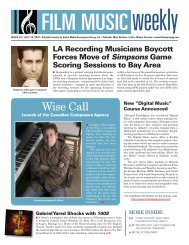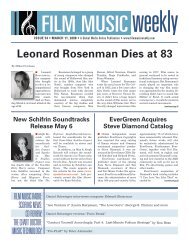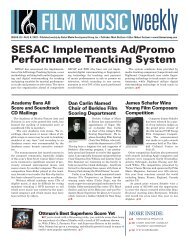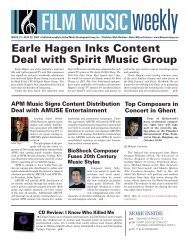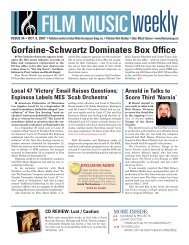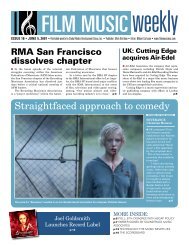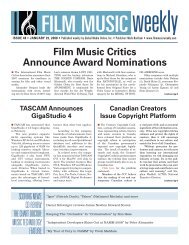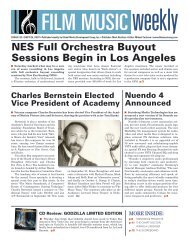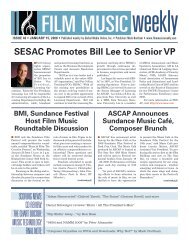Weekly - Film Music Magazine
Weekly - Film Music Magazine
Weekly - Film Music Magazine
You also want an ePaper? Increase the reach of your titles
YUMPU automatically turns print PDFs into web optimized ePapers that Google loves.
FILM MUSIC<br />
weekly<br />
Issue 42 • deCeMBeR 4, 2007 • Published weekly by Global Media Development Group, Inc. • Publisher: Mark Northam • www.filmmusicweekly.com<br />
InsIde ThIs Issue<br />
2 Zimmer Signs With Cherry Lane<br />
<strong>Music</strong> Publishing<br />
2 Watters Conducts ‘Movies Rock’<br />
2 Riptide <strong>Music</strong> to Rep Fuel Records Catalog<br />
5 Signings and Projects for Rupert Gregson-<br />
Williams, Thomas Newman and more<br />
ACID Pro 6<br />
Copyright © 2007. Sony Creative Software Inc. All rights reserved.<br />
7 Feature Article:<br />
TuneCore: Record Royalties Reinvented?<br />
12 Soundtrack Review:<br />
“Alien” (Jerry Goldsmith)<br />
14 The Chart Doctor:<br />
Trap Set Notation Basics<br />
16 <strong>Music</strong> Technology and You:<br />
Doug Rogers – Why It’s Time to PLAY<br />
ACID ® Pro 6 software is the ideal environment for composition, recording, mixing, and production. Its unique fusion<br />
of professional power and exceptional ease of use sets ACID Pro 6 software apart from all other digital audio<br />
workstations. With multitrack audio technologies, comprehensive MIDI sequencing, and legendary ACID looping<br />
functionality, ACID Pro 6 software will redefine the way you make music.<br />
www.sony.com/acidpro6<br />
Includes Native Instruments KOMPAKT<br />
sample playback engine and custom<br />
sound library—a $200 value<br />
+ + = 6
FILM MUSIC weekly<br />
Issue 42 • deCeMBeR 4, 2007 • Published weekly by Global Media Development Group, Inc. • Publisher: Mark Northam • www.filmmusicweekly.com<br />
Zimmer Signs With<br />
Cherry Lane <strong>Music</strong> Publishing<br />
n Cherry Lane<br />
<strong>Music</strong> Publishing<br />
Company Inc.,<br />
publishing administrator<br />
to film<br />
companies such<br />
as The Weinstein<br />
Company, DreamWorks Animation<br />
SKG, DreamWorks Pictures, Lakeshore<br />
Entertainment and Walden<br />
Media, has signed film composer<br />
Hans Zimmer to a worldwide, longterm<br />
publishing administration<br />
agreement.<br />
Among Zimmer’s over 100 film<br />
scores are Rain Man, Driving Miss<br />
Daisy, Pearl Harbor‚ Batman Begins,<br />
Madagascar‚ Hannibal‚ Black Hawk<br />
Down, Thelma & Louise‚ A League Of<br />
Their Own‚ As Good as It Gets, The<br />
Watters Conducts<br />
‘Movies Rock’<br />
n Veteran composer<br />
and conductor<br />
Mark<br />
Watters will conduct<br />
a 60-piece<br />
orchestra and<br />
serve as co-<strong>Music</strong><br />
Director for Movies<br />
Rock, a two-hour live event and<br />
CBS television special that will<br />
celebrate the relationship between<br />
music and film and act as a benefit<br />
for the Entertainment Industry<br />
Foundation. The event features an<br />
all-star line-up including Beyonce,<br />
Carrie Underwood, Elton John,<br />
Thin Red Line, Backdraft‚ Gladiator,<br />
Crimson Tide, The Last Samurai,<br />
The Da Vinci Code, Pirates of the Ca-<br />
ribbean: Dead Man’s Chest, and<br />
Pirates of the Caribbean: At World’s<br />
End. He won the Oscar, Golden<br />
Globe, Grammy, and Tony Award for<br />
his work on The Lion King.<br />
The parties were brought<br />
together by Cherry Lane joint<br />
venture partner Joel Sill. The<br />
veteran music publisher, record<br />
producer and music supervisor<br />
(Easy Rider, Forrest Gump, Munich,<br />
Bobby) notes, “I have had<br />
the good fortune to know Hans as a<br />
friend and as a professional. I watch<br />
and listen in amazement as he reinvents<br />
himself for each project.<br />
(continued pg.4)<br />
SCORING NEWS: “Revolutionary Road” (Thomas Newman), “Town Creek” (David Buckley) and more<br />
FEATURE ARTICLE: “TuneCore: Record Royalties Reinvented?” by Mark Holden<br />
CD REVIEW:<br />
Fergie, Jennifer Hudson, Jennifer<br />
Lopez, Marc Anthony, John Legend,<br />
Mary J. Blige, LeAnn Rimes,<br />
Chris Brown, Usher, Queen Latifah,<br />
Tony Bennett, and composer<br />
John Williams.<br />
Arrangers for the event include<br />
David Paich, Bill Ross, Jeremy<br />
Lubbock, Brad Dechter, Tom Scott,<br />
Tony Blondal, Pat Russ, Bill Elliot,<br />
and Mark Gasbarro.<br />
Beyonce is slated to sing “Somewhere<br />
Over the Rainbow” from The<br />
Wizard of Oz, while Carrie Underwood<br />
will perform the title song<br />
from “The Sound of <strong>Music</strong>.”<br />
Daniel Schweiger reviews “Alien” (Jerry Goldsmith)<br />
Riptide <strong>Music</strong> to Rep<br />
Fuel Records Catalog<br />
n Riptide <strong>Music</strong>, a source of licensed<br />
music for the advertising,<br />
feature film, film trailer, television,<br />
TV promo, and videogame industries,<br />
has announced exclusive<br />
worldwide representation<br />
of the<br />
Fuel Records catalog,<br />
comprised<br />
of over 10,000<br />
historic masters.<br />
Fuel currently owns or has longterm<br />
licenses for more than 10,000<br />
masters. Among these titles are<br />
hits including The Outsiders’ “Time<br />
Won’t Let Me,” Vanilla Fudge’s “You<br />
THE CHART DOCTOR: “Trap Set Notation Basics: Give Your Drummer A Break” by Ron Hess<br />
MUSIC TECHNOLOGY: “Doug Rogers – Why It’s Time to PLAY” by Peter Alexander<br />
Keep Me Hanging On,” Bob Welch’s<br />
“Sentimental Lady,” and The Buckingham’s<br />
“King of a Drag.” Recently,<br />
Fuel placements have included the<br />
hit films American Gangster and<br />
Bee Movie.<br />
Riptide <strong>Music</strong><br />
president Rich<br />
Goldman said,<br />
“With a growing<br />
roster of celebrity talent and the<br />
addition of Fuel’s historic masters,<br />
RipTide <strong>Music</strong> is in a great position<br />
to provide world-class choices for<br />
just about any project.” For more<br />
information visit Riptide <strong>Music</strong>.<br />
2 ISSUE 42 • DECEMBER 4, 2007 FILM MUSICweekly
FILM MUSIC<br />
Publisher: Mark Northam<br />
Editor: Mikael Carlsson<br />
VP Finance and Operations: Rebecca Lee<br />
Art Director: Joshua Young<br />
Advertising Manager: Steve Schatzberg<br />
Copy Editor: Lisa Rawson<br />
Technology Editor: Peter Alexander<br />
Soundtrack Editor: Daniel Schweiger<br />
Customer Service Manager: Robyn Young<br />
Website Design: Rakesh Rai<br />
Accounting: Tina Chiang<br />
Legal Advisor: Patricia Johnson, Esq.<br />
<strong>Film</strong> <strong>Music</strong> <strong>Weekly</strong> is published weekly by Global<br />
Media Development Group, Inc.<br />
Executive and Editorial Office: 27023 McBean<br />
Parkway Suite 618, Valencia, CA 91355.<br />
Tel: 310-645-9000 Fax: 310-388-1367,<br />
email: info@filmmusicweekly.com.<br />
We are not responsible for unsolicited material.<br />
All Rights Reserved. Reproduction in whole or in<br />
part without written permission of the publisher is<br />
prohibited. The opinions of contributing writers and<br />
editors to this publication do not necessarily reflect<br />
the views of Global Media Development Group, Inc.<br />
or any of our divisions, management or staff.<br />
LIGHT UP YOUR HEAD!<br />
EXTREME ISOLATION HEADPHONES<br />
For Drummers, Studio & Stage <strong>Music</strong>ians, Live Sound Engineers, & Composers<br />
- No bleed of click tracks into live microphones during recording<br />
-Comfortable, lightweight, durable - becoming a studio standard<br />
-Affordable professional quality hearing protection<br />
-We have the best customer service on the planet<br />
weekly<br />
www.Extremeheadphones.com<br />
Call John for a professional discount!<br />
1-314-402-4465<br />
YOUR FEEDBACK<br />
We welcome feedback on any aspect of <strong>Film</strong> <strong>Music</strong><br />
<strong>Weekly</strong>. All letters must include an address and<br />
daytime phone number. We reserve the right to edit<br />
letters for clarity and space and to use them in all<br />
electronic and print editions. Mail to: <strong>Film</strong> <strong>Music</strong><br />
<strong>Weekly</strong>, 27023 McBean Parkway Suite 618,<br />
Valencia, CA 91355 or email<br />
feedback@filmmusicweekly.com<br />
ADVERTISING<br />
Our comprehensive advertising programs offer<br />
premier visibility to film and television music professionals,<br />
soundtrack collectors, and music executives<br />
worldwide. We offer competitive rates on a<br />
wide variety of advertising opportunities including<br />
display advertising and online advertising. For more<br />
information, call 1-800-774-3700 or 310-645-9000 or<br />
email sales@filmmusicweekly.com<br />
REPRINTS AND COPYRIGHT PERMISSIONS<br />
Before quoting or reusing editorial material, or for<br />
custom reprints (minimum order 100) contact<br />
310-645-9000 or email<br />
reprints@filmmusicweekly.com<br />
SUBSCRIPTIONS<br />
Subscriptions to <strong>Film</strong> <strong>Music</strong> <strong>Weekly</strong> via email are<br />
available at no cost. To subscribe, visit our website<br />
at www.filmmusicweekly.com and enter your email<br />
address in our subscription section.<br />
<strong>Film</strong> <strong>Music</strong> <strong>Weekly</strong> and its logo are trademarks of<br />
Global Media Development Group, Inc. All Rights<br />
Reserved. Entire Contents © 2007 Global Media<br />
Development Group, Inc<br />
This Week on<br />
FMR<br />
FILM MUSIC RADIO<br />
ON THE SCORE<br />
MARK ISHAM AND<br />
FRANK DARABONT<br />
<strong>Film</strong> music journalist<br />
Daniel Schweiger interviews<br />
composer Mark Isham and<br />
director-writer Frank Darabont, who<br />
talk about their subtly scary<br />
collaboration for THE MIST<br />
LISTEN NOW<br />
INSIDE THE BUSINESS<br />
CELLIST AND FI-CORE<br />
MUSICIAN JOHN ACOSTA<br />
Mark Northam interviews one of<br />
the leading financial core musicians<br />
about his journey to financial<br />
core status and his wife’s charges<br />
against local 47<br />
LISTEN NOW<br />
FILM MUSICweekly<br />
ISSUE 42 • DECEMBER 4, 2007 3
INDUSTRY NEWS<br />
Zimmer Signs With Cherry<br />
Lane <strong>Music</strong> Publishing<br />
(continued from pg 2)<br />
On every film he searches until he finds his muse and when he finds it,<br />
it ignites his scores with music that always enhances the film.<br />
The list of directors he has and continues to work with is a testament<br />
to his creativity.”<br />
Peter Primont, CEO of Cherry Lane, remarked: “Hans Zimmer is<br />
one of the most well-respected and distinguished film composers of all<br />
time and a pioneer in his field. Cherry Lane is proud to now represent<br />
his diverse work and we look forward to a successful relationship with<br />
Hans for years to come.”<br />
The deal was negotiated by Mike Connelly, EVP Business Development,<br />
and Keith Hauprich, VP of Business and Legal Affairs, from<br />
Cherry Lane, Steve Kofsky of Remote Control Productions and Candance<br />
Carlo of Greenberg Glusker on behalf of Remote Conrol Productions.<br />
For more information, visit Cherry Lane.<br />
(continued from pg 2)<br />
Watters Conducts<br />
‘Movies Rock’<br />
Fergie will perform “Live And Let Die” from the James Bond film, and<br />
Mary J. Blige and John Legend are on board to sing “As Time Goes<br />
By” from Casablanca. Usher, fresh off a successful Broadway run in<br />
“Chicago,” will sing and dance his way through “Singin’ In the Rain”,<br />
and John Williams will conduct a medley of Academy Award winning<br />
and nominated scores. The finale will feature vocal legend, Tony Bennett<br />
singing “White Christmas.”<br />
In addition to performances, the event features Hollywood presenters<br />
and speakers including Charlize Theron, Harrison Ford, Billy<br />
Bob Thornton, Danny Devito, Matthew Broderick, Quentin Tarantino,<br />
Shirley MacLaine, Cuba Gooding, Jr., Rita Moreno, John C. Reilly,<br />
Jenna Fischer, and more. The event will air on CBS on December 7 at<br />
9:00 PM EST/PST.<br />
4 ISSUE 42 • DECEMBER 4, 2007 FILM MUSICweekly
SCORING NEWS by<br />
ThIs WeeK’s MAJOR<br />
sCORInG AssIGnMenTs<br />
Rupert Gregson-Williams:<br />
Made of Honor<br />
Rupert Gregson-Williams, who has<br />
scored recent box office hits such as<br />
Over the Hedge, Bee Movie and I Now<br />
Pronounce You Chuck and Larry, has<br />
been hired to score Made of Honor, the<br />
new romantic comedy starring Patrick<br />
Dempsey and Michelle Monaghan. The<br />
film is directed by Paul Weiland, the British<br />
helmer who made Roseanna’s Grave<br />
ten years ago, and scheduled to premiere<br />
on May 2, 2008. Gregson-Williams is<br />
also doing the music for You Don’t Mess<br />
With the Zohan, an Adam Sandler comedy<br />
directed by Dennis Dugan.<br />
Thomas Newman:<br />
Revolutionary Road<br />
Thomas Newman reunites<br />
with American<br />
Beauty director Sam<br />
Mendes. Newman<br />
will be scoring his<br />
new film Revolutionary<br />
Road, a drama<br />
which stars Leonardo<br />
DiCaprio, Kate Winslet and Kathy Bates.<br />
The film takes place in 1950s Connecticut<br />
and is an intimate drama about<br />
a young couple who struggles with their<br />
personal problems while trying to raise<br />
two children. The film is based on a novel<br />
by Richard Yates. Other talents involved<br />
in the filming is veteran cinematographer<br />
Roger Deakins. The film is scheduled<br />
to come out in December 2008 with<br />
Dreamworks handling U.S. distribution.<br />
Newman has scored all of the<br />
feature films Sam Mendes has directed:<br />
American Beauty, Road to Perdition and<br />
Jarhead.<br />
Stanley Clarke:<br />
First Sunday<br />
Stanley Clarke, the<br />
legendary bass<br />
player and an experienced<br />
film composer<br />
with credits such<br />
as The Transporter,<br />
Boyz n the Hood and<br />
Romeo Must Die on<br />
his resume, is doing the music for First<br />
Sunday, a comedy starring Ice Cube,<br />
Katt Williams and Tracy Morgan. David<br />
E. Talbert directs and Ice Cube produces<br />
together with Matt Alvarez. The story is<br />
about two criminals who come up with a<br />
desperate scheme to rob their<br />
neighborhood church. <strong>Film</strong> is scheduled<br />
to premiere on January 11, 2008, and<br />
is Stanley Clarke’s first film since Roll<br />
Bounce, which he scored in 2005.<br />
David Buckley:<br />
Town Creek<br />
Joel Schumacher’s return to the vampire<br />
film genre (he directed The Lost Boys in<br />
1987), Town Creek, will get an original<br />
score composed by David Buckley. He is<br />
a composer who has been a member of<br />
Harry Gregson-Williams’ team, doing additional<br />
music for films such as Flushed<br />
Away, Gone Baby Gone and The Number<br />
23 (also directed by Schumacher). Town<br />
Creek is Buckley’s first solo gig. The<br />
film stars Dominic Purcell, Henry Cavill<br />
and Michael Fassbender in a frightening<br />
story about an occult experiment dating<br />
back to the Third Reich. Gold Circle <strong>Film</strong>s<br />
produces.<br />
Javier Navarrete:<br />
Fireflies in the<br />
Garden Spanish composer<br />
Javier Navarrete, who<br />
came to international<br />
prominence with his<br />
Oscar-nominated<br />
score for Guillermo<br />
del Toro’s Pan’s<br />
Labyrinth last year, is<br />
currently working on the score for Fireflies<br />
in the Garden, a drama starring Julia<br />
Roberts, Willem Dafoe, Emily Watson,<br />
Carrie-Anne Moss and Ryan Reynolds.<br />
Written and directed by Dennis Lee, the<br />
film centers on an intimate and personal<br />
depiction of a family struck by an unexpected<br />
tragedy. Navarrete has been<br />
busy since he scored Pan’s Labyrinth,<br />
working for French veteran filmmaker<br />
Jean-Jacques Annaud on His Majesty<br />
Minor and with director Iain Softley on<br />
his fantasy adventure Inkheart.<br />
Graeme Revell:<br />
The Night Watchman<br />
The Night Watchman,<br />
a crime thriller<br />
based on a story and<br />
screenplay by James<br />
Ellroy of L.A. Confidential<br />
fame, will<br />
get an original score<br />
by Graeme Revell<br />
(Sin City, From Dusk<br />
Till Dawn, Daredevil), one of the film’s<br />
producers confirmed to Upcoming <strong>Film</strong><br />
Scores/<strong>Film</strong> <strong>Music</strong> <strong>Weekly</strong> today. DJ<br />
Muggs, an LA music artist, is also contributing<br />
to the score. John Houlihan<br />
and Season Kent are the music supervisors<br />
on the film. The Night Watchman is<br />
directed by David Ayer who previously<br />
worked with Revell on Harsh Times.<br />
Keanu Reeves portrays a veteran cop<br />
who is drawn into a story where loyalty<br />
conflicts and a corrupted cop culture are<br />
key elements. Other actors in the film<br />
include Hugh Laurie, Chris Evans and<br />
Forest Whitaker.<br />
The sCOReBOARd<br />
Panu Aaltio: The Home of Dark Butterflies.<br />
Tree Adams: Emilio • Farewell Bender.<br />
Eric Allaman: Race.<br />
John Altman: The Master Builder.<br />
Marco D’Ambrosio: Say Hello to Stan<br />
Talmadge.<br />
Michael Andrews: Walk Hard: The Dewey<br />
Cox Story.<br />
David Arnold: How to Loose Friends and<br />
Alienate People • Bond 22.<br />
Angelo Badalamenti: The Eye • The Edge<br />
of Love.<br />
Klaus Badelt: Heaven and Earth • Killshot<br />
• Dragon Hunters.<br />
Roque Baños: Las 13 Rosas • The Oxford<br />
Murders.<br />
Lesley Barber: A Thousand Years of Good<br />
Prayers.<br />
Nathan Barr: Watching the Detectives •<br />
Tortured.<br />
Tyler Bates: Day of the Dead • Doomsday<br />
• Watchmen.<br />
Jeff Beal: Where God Left His Shoes • Salomaybe?<br />
• The Deal • The Pixar Story.<br />
Christophe Beck: Drillbit Taylor.<br />
Marco Beltrami: In the Electric Mist with<br />
Confederate Dead • The Eye.<br />
Jean-Michael Bernard: Be Kind Rewind<br />
• Détrempoez-vous.<br />
Charles Bernstein: Tenebrous.<br />
Doug Besterman: Exit Speed.<br />
Scott Bomar: Maggie Lynn.<br />
Simon Boswell: Bathory.<br />
Jason Brandt: Something’s Wrong in<br />
Kansas.<br />
David Buckley: Town Creek.<br />
Mickey Bullock: Sportkill • Orville.<br />
Kenneth Burgomaster: Garfield Gets Real<br />
• Hero Wanted.<br />
Carter Burwell: In Bruges.<br />
Edmund Butt: The Waiting Room.<br />
Niall Byrne: How About You.<br />
Brian Cachia: Gabriel.<br />
Peter Calandra: The Sickness.<br />
Paul Cantelon: The Other Boleyn Girl.<br />
Jeff Cardoni: Save Me • American Pie: Beta<br />
House.<br />
Jamie Christopherson: Ghost Image.<br />
Nigel Clarke & Michael Csányi-Wills: The<br />
Grind.<br />
Stanley Clarke: First Sunday.<br />
George S. Clinton: Harold and Kumar 2.<br />
Elia Cmiral: The Deaths of Ian • Missionary<br />
Man • Tooth and Nail.<br />
Chandra Cogburn: Fiesta Grand • Orgies<br />
and the Meaning of Life • The Bard: The<br />
Story of Robert Burns.<br />
MIKAeL CARLssOn<br />
mcarlsson@filmmusicweekly.com<br />
Graham Collins: Black Kissinger.<br />
Juan J. Colomer: Dark Honeymoon.<br />
Eric Colvin: Mariposa.<br />
Ry Cooder: : Charlie Wilson’s War.<br />
Normand Corbeil: Ma fille, mon ange •<br />
Boot Camp • Emotional Arithmetic.<br />
Jane Antonia Cornich: Island of Lost Souls<br />
• Solstice.<br />
Burkhard Dallwitz: The Interrogation of<br />
Harry Wind • Chainsaw.<br />
Jeff Danna: Closing the Ring • C7.<br />
Carl Davis: The Understudy.<br />
Marcello De Francisci: The Butcher.<br />
Wolfram de Marco: The Tribe.<br />
Jessica de Rooij: Postal • Tunnel Rats • Far<br />
Cry • In the Name of the King: A Dungeon<br />
Siege Tale.<br />
John Debney: Big Stan • Sin City 2 • Starship<br />
Dave • Old Dogs.<br />
Erik Desiderio: He’s Such a Girl.<br />
Alexandre Desplat: The Golden Compass.<br />
Ramin Djawadi: Fly Me to the Moon • The<br />
Tourist • Iron Man.<br />
James Michael Dooley: Bachelor Party 2.<br />
Patrick Doyle: Nim’s Island.<br />
Ludek Drizhal: Life Goes On • Badland.<br />
Anne Dudley: The Walker.<br />
Clint Eastwood: Grace Is Gone.<br />
Randy Edelman: 27 Dresses • The<br />
Mummy: Tomb of the Dragon Emperor.<br />
Jonathan Edwards: The Golden Boys.<br />
Steve Edwards: Finding Rin-Tin-Tin • The<br />
Neighbor • The Intervention.<br />
Danny Elfman: Wanted • The Sixth Element<br />
• Hellboy 2: The Golden Army.<br />
Stephen Endelman: The Grand • Redbelt.<br />
Tom Erba: Chinaman’s Chance.<br />
Ilan Eshkeri: The Virgin Territories • Strength<br />
and Honor.<br />
Evan Evans: The Mercy Man • You’re<br />
Nobody ‘Til Somebody Kills you.<br />
Nima Fakhara: Lost Dream.<br />
Sharon Farber: When Nietzsche Wept.<br />
Guy Farley: The Flock • The Christmas<br />
Miracle of Jonathan Toomey • Knife Edge •<br />
Dot Com • The Broken • Dylan.<br />
George Fenton: Fool’s Gold.<br />
Chad Fischer: The Babysitters.<br />
Robert Folk: Kung Pow: Tongue of Fury •<br />
Magdalene • Vivaldi.<br />
Jason Frederick: Good Chemistry • Bears.<br />
John Frizzell: Careless • First Born.<br />
Michael Giacchino: Star Trek XI.<br />
Richard Gibbs: Cleaner.<br />
Vincent Gillioz: The Appearance of Things<br />
• Portal.<br />
Scott Glasgow: Hack! • Toxic • The Gene<br />
Generation • Bone Dry • Lo • The Bridge to<br />
Nowhere.<br />
Philip Glass: Cassandra’s Dream • Les<br />
animaux amoreux.<br />
Erik Godal: The Gift • Ready Or Not • Irreversi.<br />
Jonathan Goldsmith: Tenderness.<br />
Jeff Grace: Trigger Man • I Sell the Dead •<br />
Liberty Kid.<br />
Harry Gregson-Williams: Jolene • The Chronicles<br />
of Narnia: Prince Caspian • G-Force<br />
• Wolverine.<br />
Rupert Gregson-Williams: You Don’t Mess<br />
With the Zohan • Made of Honor.<br />
Andrew Gross: Forfeit • National<br />
Lampoon’s Bag Boy • Diamond Dog Caper.<br />
FILM MUSICweekly<br />
ISSUE 42 • DECEMBER 4, 2007 5
<strong>Film</strong> <strong>Music</strong> <strong>Weekly</strong>’s “The Scoreboard” only lists scoring assignments that have been confirmed to us by official sources.<br />
The list is limited to feature film scoring assignments. New additions are highlighted in red print.<br />
Larry Groupé: Love Lies Bleeding • The<br />
Hungry Woman • Straw Dogs.<br />
Robert Gulya: Atom Nine Adventures.<br />
Steven Gutheinz: Rothenburg.<br />
Richard Hartley: Diamond Dead.<br />
Richard Harvey: Legend of King Naresuan<br />
• Eichmann.<br />
Paul Haslinger: Gardener of Eden • Prom<br />
Night.<br />
Paul Heard: Clubbed.<br />
Alex Heffes: My Enemy’s Enemy • State of<br />
Play • Sweeney Todd.<br />
Christian Henson: Zomerhitte.<br />
Eric Hester: The Utopian Society • Lost<br />
Mission • Frail.<br />
Tom Hiel: A Plumm Summer.<br />
David Hirschfelder: Shake Hands With the<br />
Devil.<br />
Ben Holbrook: Kiss the Bride.<br />
James Horner: The Spiderwick Chronicles.<br />
• Avatar • In Bloom.<br />
Richard Horowitz: Genghis Khan •<br />
Kandisha • The Whisperers.<br />
James Newton Howard: The Waterhorse<br />
• I Am Legend • Charlie Wilson’s War •<br />
The Great Debaters • Mad Money • The<br />
Happening.<br />
Terry Huud: Plaguers.<br />
Alberto Iglesias: The Kite Runner.<br />
Mark Isham: Pride and Glory • The Express.<br />
Corey Allen Jackson: Idiots and Angels.<br />
James Jandrisch: American Venus.<br />
Adrian Johnston: Sparkle • Brideshead<br />
Revisited.<br />
Bobby Johnston: American Fork • Stuck •<br />
Hotel California • Happiness Runs.<br />
Evan Jolly: Tonight Is Cancelled.<br />
Tim Jones: Cryptid.<br />
Trevor Jones: Fields of Freedom • The<br />
Power of the Dark Crystal.<br />
David Julyan: Waz.<br />
George Kallis: Antigravity.<br />
Tuomas Kantelinen: Quest for a Heart •<br />
Arn: The Knight Templar • Mongol.<br />
Yagmur Kaplan: The Elder Son • The Lodge<br />
• Broken Windows.<br />
Laura Karpman: Man in the Chair • Out at<br />
the Wedding.<br />
Rolfe Kent: Spring Break in Bosnia • Sex<br />
and Death 101.<br />
Wojciech Kilar: Black Sun.<br />
Mark Kilian: Before the Rains.<br />
David Kitay: Shanghai Kiss • Blonde<br />
Ambition.<br />
Harald Kloser: 10,000 BC.<br />
Abel Korzeniowski: Terms.<br />
Penka Kouneva: The Third Nail • Richard III<br />
• Midnight Movie.<br />
Ivan Koutikov: Wanted Undead Or Alive •<br />
Living Hell.<br />
Aryavarta Kumar: The Rapture • Greater<br />
Threat.<br />
Nathan Larson: August • Choke.<br />
Jim Latham: Greetings from the Shore •<br />
Swishbucklers • Parental Guidance Suggested.<br />
Christopher Lennertz: Alvin and the<br />
Chipmonks • The Perfect Christmas • Meet<br />
the Spartans.<br />
Craig Leon: Maestro.<br />
Geoff Levin: Triloquist • The Rat Thing •<br />
Agenda • The Fallen.<br />
Michael A. Levine: Adrift in Manhattan.<br />
Christopher Libertino: Off the Grid – Life<br />
on the Mesa • The Forgotten Kingdom.<br />
Jason & Nolan Livesay: Bounty • Limbo<br />
Lounge.<br />
Andrew Lockington: Step • How She<br />
Move • Journey 3-D.<br />
Joseph LoDuca: Bar Starz • My Name Is<br />
Bruce • Boogeyman 2.<br />
Henning Lohner: In the Name of the King:<br />
A Dungeon Siege Tale • Timber Falls •<br />
Kleiner Dodo.<br />
Helen Jane Long: Surveillance.<br />
Erik Lundborg: Absolute Trust.<br />
Deborah Lurie: Spring Breakdown.<br />
Vivek Maddala: They Turned Our Desert<br />
Into Fire.<br />
Nuno Malo: Mr. Hobb’s House.<br />
Mark Mancina: Sheepish • Camille • Without<br />
a Badge • Like Dandelion Dust.<br />
Harry Manfredini: Black Friday • iMurders •<br />
Impulse • Anna Nicole • Dead and Gone.<br />
David Mansfield: Carnaval de Sodoma •<br />
Then She Found Me • The Guitar.<br />
Dario Marianelli: Shrooms • Far North •<br />
The Soloist.<br />
Anthony Marinelli: Grizzly Park.<br />
Gary Marlowe: Los Pereyra • Das echo der<br />
Schuld.<br />
Phil Marshall: Live.<br />
John McCarthy: The Stone Angel.<br />
Mark McKenzie: The Redemption of Sarah<br />
Cain.<br />
Joel McNeely: The Tinkerbell Movie.<br />
Nathaniel Mechaly: Sans moi • Le Dernier<br />
gang • La Chambre des morts.<br />
Matt Messina: Juno • The Least of These.<br />
Guy Michelmore: Doctor Strange • Bono,<br />
Bob, Brian and Me.<br />
Randy Miller: Last Time Forever • Shanghai<br />
Red • Second Chance Season.<br />
Robert Miller: Teeth • The Key Man •<br />
Trumbo.<br />
Sheldon Mirowitz: Renewal • Operation<br />
<strong>Film</strong>maker.<br />
Charlie Mole: Fade to Black • I Really Hate<br />
My Job • St. Trinian’s.<br />
John Morgan: The Opposite Day (cocomposer).<br />
Paul Leonard-Morgan: Popcorn.<br />
Trevor Morris: Matching Blue • Krews.<br />
Mark Mothersbaugh: Mama’s Boy • Quid<br />
Pro Quo • Fanboys.<br />
Sean Murray: The Lost • Clean Break.<br />
Peter Nashel: Wedding Daze.<br />
Javier Navarrete: His Majesty Minor • Mirrors<br />
• Inkheart • Fireflies in the Garden.<br />
Blake Neely: Elvis and Anabelle • The Great<br />
Buck Howard.<br />
Roger Neill: Take • Scar.<br />
David Newman: Welcome Home Roscoe<br />
Jenkins.<br />
Joey Newman: Safe Harbour.<br />
Randy Newman: Leatherheads • The Frog<br />
Princess.<br />
Thomas Newman: Nothing Is Private •<br />
Wall-E • Revolutionary Road.<br />
Marinho Nobre: Left for Dead.<br />
Adam Nordén: Everybody’s Dancing • Wolf<br />
• De Gales hus.<br />
Julian Nott: Heavy Petting.<br />
Paul Oakenfold: Victims.<br />
Dean Ogden: Oranges • Knuckle Draggers<br />
• A Perfect Season.<br />
John Ottman: Valkyrie.<br />
John Paesano: Shamrock Boy.<br />
Heitor Pereira: Suburban Girl • The Canyon<br />
• Running the Sahara.<br />
Mark Petrie: The Road to Empire • Lake<br />
Dead • Mr. Blue Sky • Valley of Angels •<br />
Farmhouse.<br />
Barrington Pheloung: And When Did you<br />
Last See your Father?.<br />
Leigh Phillips: War Made Easy • Still Life.<br />
Martin Phipps: Grow your Own.<br />
Nicholas Pike: The Shooter • Parasomnia.<br />
Nicola Piovani: Odette Toulemonde.<br />
Douglas Pipes: Trick r’ Treat.<br />
Steve Porcaro: The Wizard of Gore •<br />
Cougar Club.<br />
John Powell: Horton Hears a Who •<br />
Jumper.<br />
Michael Price: Sugarhouse Lane • Agent<br />
Crush.<br />
Trevor Rabin: National Treasure 2: The Book<br />
of Secrets • Get Smart.<br />
Didier Lean Rachou: How to Rob a Bank •<br />
An American in China.<br />
Brian Ralston: Graduation • 9/Tenths.<br />
Jasper Randall: Me & you, Us, Forever •<br />
The Secrets of Jonathan<br />
Sperry.<br />
Joe Renzetti: 39 • Universal Signs.<br />
Graeme Revell: Pineapple Express • Days<br />
of Wrath • The Night Watchman.<br />
Graham Reynolds: I’ll Come Running.<br />
Zacarías M. de la Riva: The Last of the Just<br />
• The Anarchist’s Wife.<br />
Carmen Rizzo: The Power of the Game.<br />
Matt Robertson: The Forest.<br />
Douglas Romayne: In Zer0: Fragile Wings.<br />
Philippe Rombi: Angel.<br />
Brett Rosenberg: The Skeptic.<br />
Laura Rossi: The Cottage.<br />
David Glen Russell: Contamination.<br />
Hitoshi Sakamoto: Romeo x Juliet.<br />
H. Scott Salinas: Strictly Sexual • What We<br />
Did on Our Holidays.<br />
Anton Sanko: Life in Flight • Steep.<br />
Gustavo Santaolalla: Things We Lost in<br />
the Fire (themes).<br />
Brian Satterwhite: Cowboy Smoke •<br />
Maidenhead.<br />
Mark Sayfritz: Sake.<br />
Brad Sayles: The Bracelet of Bordeaux.<br />
David Schommer: War, Inc.<br />
Misha Segal: Lost at War • Shabat Shalom<br />
Maradona.<br />
Marc Shaiman: Hairpsray • Slammer • The<br />
Bucket List.<br />
Theodore Shapiro: Mr Woodcock • The<br />
Mysteries of Pittsburgh •<br />
The Girl in the Park • Semi-Pro • Tropic<br />
Thunder • The Heartbreak Kid.<br />
George Shaw: Victim • Sailfish.<br />
Edward Shearmur: Passengers • Bill •<br />
College Road Trip.<br />
Ryan Shore: The Girl Next Door • Numb •<br />
Jack Brooks – Monster<br />
Slayer • Shadows.<br />
Vince Sievers: The Source.<br />
Carlo Siliotto: La MIsma Luna • The Ramen<br />
Girl.<br />
Samuel Sim: Awake.<br />
Marcus Sjöwall: Dreamkiller.<br />
Cezary Skubiszewski: Death Defying Acts<br />
• Disgrace.<br />
Damion Smith: Stompin.<br />
Jason Solowsky: 110%: When Blood,<br />
Sweat and Tears Are Not Enough • The<br />
Deepening • L.A Takedown • Unemployed •<br />
North by El Norte.<br />
Maarten Spruijt: The Seven of Daran:<br />
Battle of Pareo Rock.<br />
Mark Hinton Stewart: Man from Earth.<br />
Marc Streitenfeld: Body of Lies.<br />
William T. Stromberg: TV Virus • Army of<br />
the Dead • The Opposite Day (co-composer).<br />
Jina Sumedi: Sextet.<br />
Mark Suozzo: The Nanny Diaries.<br />
John Swihart: The Brothers Solomon.<br />
Johan Söderqvist: Walk the Talk • Let the<br />
Right One In.<br />
Joby Talbot: Son of Rambow.<br />
Frederic Talgorn: Asterix at the Olympic<br />
Games • Largo Winch • Dragon Hunters.<br />
Francois Tétaz: Rogue.<br />
Mark Thomas: Tales of the Riverbank.<br />
tomandandy: The Koi Keeper.<br />
John van Tongeren: War Games 2 - The<br />
Dead Code.<br />
Pinar Toprak: Blue World • Dark Castle •<br />
Serbian Scars • Say It In Russian • Ocean<br />
of Pearls.<br />
Jeff Toyne: Shadow in the Trees • Within •<br />
Late in the Game.<br />
Michael Tremante: If I Didn’t Care.<br />
Gregory Tripi & Kyle Batter: Dark Storm •<br />
Termination Point.<br />
Ernest Troost: Crashing.<br />
Brian Tyler: Alien vs. Predator 2 • John<br />
Rambo • The Heaven Project.<br />
Shigeru Umebayashi: A Simple Love Story.<br />
Cris Velasco: Prep School.<br />
Waddy Wachtel: Strange Wilderness.<br />
Reinhardt Wagner: L’Heure zéro.<br />
Michael Wandmacher: The Killing Floor •<br />
Train • Get Some.<br />
Stephen Warbeck: Flawless • Miguel and<br />
William • The Box Collector.<br />
Matthias Weber: Silent Rhythm.<br />
Richard Wells: The Mutant Chronicles.<br />
Cody Westheimer: Benny Bliss and the<br />
Disciples of Greatness • Hysteria.<br />
Alan Williams: For the Love of a Dog • Act<br />
Your Age • Snow Princess • He Love Her,<br />
She Loves Him Not • The Velveteen Rabbit.<br />
David Williams: The Conjuring.<br />
John Williams: Indiana Jones and the Kingdom<br />
of the Crystal Skull • Lincoln.<br />
Patrick Williams: Mikey and Dolores.<br />
Tim Williams: Afterthought • The Passage<br />
• Starcrossed.<br />
Austin Wintory: Captain Abu Raed • Mr.<br />
Sadman • Grace.<br />
Debbie Wiseman: Amusement.<br />
Chris Wood: Zombies Ate My Prom Date.<br />
Alex Wurman: Bernard and Doris • Baggage<br />
• Quebec.<br />
Gabriel Yared: Manolete • The No. 1 Ladies<br />
Detective Agency.<br />
Christopher Young: Sleepwalking • Untraceable.<br />
Geoff Zanelli: Delgo • Outlander • Ghost<br />
Town.<br />
Marcelo Zarvos: What Just Happened?<br />
Aaron Zigman: Home for Christmas • Step<br />
Up 2 the Streets • Smart People • Lake City.<br />
Hans Zimmer: Frost/ Nixon • Casi Divas •<br />
Kung Fu Panda.<br />
Atli Örvarsson: Vantage Point • Babylon<br />
A.D.<br />
6 ISSUE 42 • DECEMBER 4, 2007 FILM MUSICweekly
FEATURE ARTICLE<br />
TuneCore: Record Royalties Reinvented?<br />
TuneCore is a<br />
unique service<br />
that both allows<br />
artists to get their<br />
music placed<br />
on iTunes and<br />
other online<br />
music stores<br />
and provides a<br />
detailed reporting<br />
interface for<br />
artists listing the<br />
royalties earned<br />
from online music<br />
store sales. Artists<br />
Jeff Price<br />
can monitor their<br />
online music store royalty earnings to the penny,<br />
and can easily withdraw accumulated royalty<br />
earnings from their TuneCore account. TuneCore<br />
currently boasts over 318,000 songs delivered<br />
to the online music stores and over $3 million in<br />
earnings by TuneCore customers.<br />
Please tell us about your background<br />
and experience in the music business.<br />
For 19 years, I co-owned and operated a record<br />
label called Skin Art Records, which released<br />
somewhere in the neighborhood of 220 albums.<br />
Over those two decades, we were in label deals<br />
with Sony, BMG, Warner <strong>Music</strong> Group, Universal,<br />
Polygram Publishing — the whole gamut. In 1996<br />
or so, I had the good fortune to meet Gene Hoffman<br />
and Bob Kohn, the two founders of E<strong>Music</strong>,<br />
and contributed toward its original business<br />
plan along with assisting them in raising venture<br />
capital. I began to do licensing deals and master<br />
acquisitions for E<strong>Music</strong> as well as business development,<br />
eventually moving from New York to<br />
San Francisco. Once E<strong>Music</strong> was sold to Vivendi,<br />
I returned to New York. That’s when I came up<br />
with the concept for TuneCore. We went to market<br />
and live with TuneCore in January of 2006.<br />
Tell us about the TuneCore business<br />
model and its relevance in today’s record<br />
market.<br />
To really get the value of TuneCore, it’s important<br />
to understand what the record business has<br />
been in the past 100 years or so. Let’s equate<br />
a commercial music release to a wristwatch,<br />
and that you want to sell your watch in a Boston<br />
shop. So you say to the shopkeeper, “Hey, I<br />
wanna sell my watch in your store.” They say<br />
okay and ask you how much you want for it if it<br />
sells. You say 10 bucks, and they tell you to come<br />
back at the end of the month. When you return,<br />
if the watch is still there, you take it back. But if<br />
the watch is gone, the shopkeeper hands you a<br />
ten spot.<br />
For the purposes of your illustration,<br />
what did the shop sell it for?<br />
That’s just it — you have no idea. They could’ve<br />
given it away or sold it for hundreds of dollars.<br />
Under that deal, it doesn’t matter what the<br />
shopkeeper sold it for as long as you get your<br />
wholesale price of 10 dollars. But you are selling<br />
watches. So one day, you get a call from Joe<br />
Smith in Chicago, and Joe says, “Hey, I heard<br />
about your watches selling in Boston. Tell you<br />
what, ship me your entire inventory and I’ll put<br />
‘em in my giant warehouse. The minute I receive<br />
them, they’re gonna be insured — and I got<br />
a whole staff of people running around taking<br />
orders, packing, and shipping watches all over<br />
the country. Here’s the deal: when your watch<br />
leaves my warehouse, you’re gonna get paid. It<br />
doesn’t matter if the order comes in low, I’ll still<br />
guarantee your price. If it gets busted in transit,<br />
I’ll take the stuff back and make it all good at no<br />
cost to you.”<br />
That beats the original deal in Boston.<br />
“But wait,” Joe says. “There’s more! I got an<br />
even bigger staff running all over the country<br />
at places where the watch store buyers get<br />
together. My people meet with the buyers — you<br />
know, the folks who are responsible for putting<br />
stock on the shelves. We dazzle ‘em with pitches,<br />
catalogs and free samples. We got a built-in sales<br />
force for ya.<br />
Okay, so now our “watchmaker” is really<br />
moving product.<br />
That’s right. But Joe’s sales team is fighting for<br />
a finite amount of retail shelf space in those<br />
stores. That’s the crucial fact. The store can’t carry<br />
everything, they can only carry what fits. So Joe’s<br />
people will fight to make sure your watches get<br />
to the shelves over the watches of other people.<br />
And further, Joe’s folks will monitor sales reports<br />
and replenish the inventories of the stores so you<br />
can sell even more watches.<br />
How else does Joe, the distributor,<br />
sweeten the deal with our watchmaker?<br />
On top of all that distribution, Joe promises to<br />
work with the retailers to advertise your watches<br />
within the store premises — which is sure to<br />
boost sales. Maybe have special signs or displays<br />
By Mark Holden<br />
to put the product out front for the buyer to see.<br />
That takes money, of course, to pay the retailer<br />
for all the special treatment, but Joe promises to<br />
advance all the necessary funds.<br />
Let’s make sure we’re all up to speed.<br />
Our watchmaker is getting his wholesale<br />
price from Joe, the distributor. How is<br />
Joe making money?<br />
Remember, all the stock that’s in these retail<br />
stores is on consignment. Just like the store in<br />
Boston — if the stuff doesn’t sell, people come<br />
to take it away for a full refund. So Joe deals with<br />
collecting all the money, processes the returned<br />
product, the whole nine yards. Of course, Joe<br />
wants something for all the effort he and his<br />
people are expending. So Joe makes a deal with<br />
the store to receive 25% of all the sales. For<br />
every dollar of sales, Joe will receive a quarter<br />
and the retailer keeps the rest.<br />
So now you’ll correlate this business of<br />
watches to the music industry?<br />
Oh, yes. Only the “watchmakers” in this example<br />
are really the record labels, not the people<br />
who actually create the watches or the music.<br />
The labels go out and hire people to make music,<br />
obtain the rights to conduct the business at<br />
hand, manufacture copies of the music and hand<br />
them off to Joe, the distributor, in Chicago who<br />
puts the music in the stores. To the makers of<br />
the music, the label typically pays the artist $1.35<br />
to $1.75 per unit.<br />
So the age-old question emerges. Is the<br />
artist truly benefiting from the record<br />
label and Joe’s distribution machine —<br />
or is the artist at the mercy of it?<br />
Any way you want to look at it, when you replace<br />
watches with music, the record industry — outside<br />
of the service sector — has been about distribution.<br />
Record labels generate their revenues<br />
from the exploitation of master recordings, and<br />
that’s the intent of the contractual language. We<br />
take this ephemeral thing, these sound waves<br />
captured from the air, and find ways to place<br />
them into a contrivance that can be made available<br />
for purchase in a store so a customer can<br />
take it home for use in a device that allows them<br />
to hear the sound waves.<br />
So on a purely transactional basis, putting lemonflavored<br />
Pepsi and Mariah Carey recordings on<br />
store shelves is a very similar process.<br />
(Continued pg 8)<br />
FILM MUSICweekly<br />
ISSUE 42 • DECEMBER 4, 2007 7
FEATURE ARTICLE<br />
TuneCore: Record Royalties Reinvented? (continued from pg 7)<br />
And in either case, so many outstretched<br />
palms along the way.<br />
Absolutely. Let’s take the example of Sony<br />
BMG, which happens to own a label known<br />
as Columbia Records. Let’s look at the label as<br />
essentially research and development that may<br />
identify the next lemon-flavored Pepsi to its parent<br />
corporation in the person of artist XYZ Jones.<br />
Columbia signs Jones and assigns a producer to<br />
the project, takes Jones into the studio, records<br />
the product, molding and shaping along the way,<br />
wanting the final product to be mass consumable<br />
as opposed to being of niche appeal. Then<br />
the label gets busy with the packaging and<br />
manufacturing of the product, handing it off to its<br />
parent company that happens to be a worldwide<br />
distributor. Pretty soon, we’ve got what is hoped<br />
to be a hot new product on store shelves.<br />
Of course, the label will invoice the artist<br />
for its services rendered as stipulated<br />
in the recoupment language in the<br />
record contract.<br />
Yes, they will. And it hits spreadsheets differently.<br />
Or they do the 25% package deduction. But the<br />
immediate goal of the artist, label, and distributor<br />
is to create demand for the product via marketing<br />
and promotion. That’s the record industry.<br />
Up until fairly recently, we exclusively distributed<br />
music contained on 5-inch circular plastic discs<br />
that insert into square plastic boxes wrapped in<br />
cellophane for display in store racks and shelves.<br />
Of course, the sale is the thing.<br />
You bet. And one of the primary reasons an artist<br />
will seek to sign with a record label is to gain<br />
access to distribution. That’s where the magic<br />
happens — at the cash register. If the product<br />
isn’t on the shelf in the first place, there will be<br />
no purchase. If the sale can’t happen, quite obviously,<br />
the music can’t be sold. It’s access to the<br />
shelf space that many, many artists are seeking.<br />
Artists are also seeking marketing and<br />
promotion.<br />
Yes, that’s the flip side to being on the shelves<br />
— creating demand. Traditionally, record labels<br />
would market and promote in three ways, the<br />
rudiments of which are really incredibly simple. It<br />
comes down to providing the music for people to<br />
listen to, to play, and to tell other people about.<br />
That’s it, man. It’s just that simple. That’s what<br />
music marketing is.<br />
And the three ways to create demand?<br />
One is commercial radio. On a mass level, that’s<br />
how people traditionally were introduced to new<br />
music. I’m not talking about niche product, I’m<br />
talking 14 million Alanis Morissettes. The second<br />
way, traditionally, is that people would discover<br />
new music through television — outlets like<br />
MTV, VH1, and other music properties, or on the<br />
Letterman show or Conan O’Brian. The third way<br />
people got into new releases was through print<br />
publications like Rolling Stone, Creme, Spin, and<br />
so forth. These three outlets, television, radio,<br />
and print, would determine what was going to be<br />
exposed based on what the record labels pushed<br />
to them. These three mediums, so to speak,<br />
would pick and choose from the pool of available<br />
artists as to who they were going to expose. And<br />
hopefully, interest would become demand and<br />
translate into sales.<br />
And if you were an artist or a band not<br />
signed to a label?<br />
Difficult. Without the benefit of being pushed via<br />
the three media outlets, exposure was not going<br />
to happen. A one in a million shot, at best.<br />
Okay, that’s an excellent primer on how<br />
the record industry used to work before<br />
the advent of online delivery. Now, take<br />
us into the digital world.<br />
It’s a drastic shift in the lay of the land. Digital<br />
stores have fundamentally changed the industry<br />
landscape because you no longer need to fight<br />
for the shelf space that was so precious with<br />
traditional retailers. Now there is virtual, unlimited<br />
shelf space — it never ends. You deliver a music<br />
file to a server once and that track can forever<br />
be in stock. There’s not only virtual unlimited<br />
inventory with no need for replenishment, but it<br />
also alleviates the costs previously incurred for<br />
overstocking and returns. Entire ledgers of costs<br />
disappear.<br />
What are the other features of this shift<br />
in the landscape?<br />
The important thing to note is that we have this<br />
hundred-year-old paradigm that is constructed<br />
around distribution. Much of the power of the<br />
major record companies is derived from their<br />
ability to get product into stores. Now if you don’t<br />
need a huge pack-and-ship warehouse to deliver<br />
the goods, don’t need a big field staff, don’t need<br />
co-opt dollars, and you don’t need inventory —<br />
what do you need with those old distribution<br />
mechanisms?<br />
Well, the big retailers still sell slews of<br />
CDs. Their paint isn’t peeling just yet.<br />
True. But the 4th largest seller of music in<br />
America is iTunes, after Wal-Mart, Target, and<br />
Best Buy. That’s a huge paradigm shift with more<br />
to come. And as with my own label, Spin Art<br />
Records, over 50% of our total album sales come<br />
from a single retailer—iTunes. Digital delivery is<br />
not some fractional novelty of an outlet. It’s here,<br />
it’s real, it’s happening.<br />
Okay, we’ve got it. Legitimate online<br />
delivery of music is here to stay. Bring<br />
on the digital retailers!<br />
Yes, up come the online stores that are changing<br />
the landscape, but the terms of business aren’t<br />
changing with all the changes and savings in<br />
expenditures. Many of the aggregators are following<br />
the old business paradigm.<br />
You’d better give us a working definition<br />
of “aggregator.”<br />
An aggregator such as TuneCore assembles<br />
many parts that can constitute a whole. Any<br />
number of bands or artists can be listed under a<br />
single banner or masthead, such as representation<br />
from an agency or a deal with a record label.<br />
The artists remain separate entities, but they can<br />
also be presented as a group of individuals for a<br />
variety of purposes. That’s what an aggregator<br />
does.<br />
How about a practical example of aggregation?<br />
Let’s take the example of Joe, the distributor,<br />
in Chicago. The retailers like working with Joe<br />
because he’s collected all kinds of variety under<br />
one roof that makes it convenient for the stores<br />
to stock their shelves. Instead of the stores having<br />
to administer fifty contracts with individual<br />
suppliers, they can do one contract with Joe who<br />
already has deals in place to represent those<br />
fifty suppliers and many more. From a business<br />
standpoint, aggregation is a convenience that<br />
saves time and money along with minimizing<br />
administrative traffic, liabilities, insurances, shipping,<br />
you name it. Imagine Tower Records trying<br />
to account to every artist, every band, and every<br />
band member for each album they sell. Instead,<br />
they account to the distribution arm of the record<br />
labels.<br />
Then describe for us this “virtual aggregator”<br />
in the world of digital downloads.<br />
Ideally, digital stores would like to go to a single<br />
source to access every piece of music ever<br />
recorded.<br />
(Continued pg 9)<br />
8 ISSUE 42 • DECEMBER 4, 2007 FILM MUSICweekly
FEATURE ARTICLE<br />
TuneCore: Record Royalties Reinvented? (continued from pg 8)<br />
Of course, that’s not going to happen. But from<br />
the store’s perspective, the convenience is to<br />
account to a manageable number of record labels<br />
and other aggregators offering master recordings<br />
for authorized downloading. They’d much rather<br />
do one deal with a service offering a gazillion<br />
artists than to attempt to administrate a gazillion<br />
individual deals — it’s just that simple.<br />
What does TuneCore do to enable access<br />
to this brave new world?<br />
TuneCore provides direct access to iTunes, Rhapsody,<br />
e<strong>Music</strong>, Napster, Connect, Yahoo! <strong>Music</strong>,<br />
Urge, and Zune. We do this for straight, annual<br />
fees, including the foreign language versions of<br />
those services overseas. We aggregate many<br />
individuals into a whole that the online stores can<br />
effectively deal with.<br />
You mentioned aggregators who are using<br />
the playbook of the old paradigm. .<br />
Companies pop up wanting to appeal to the<br />
smaller indie record labels and unsigned artists<br />
as well. They go out and do access deals with<br />
iTunes and others knowing the smaller entities<br />
can’t do it for themselves. They pitch placement<br />
with many of the online stores. BUT, if an<br />
indie label or artist wants placement into the<br />
online services, they have to sign the aggregator’s<br />
contract. And the contract is often based<br />
on the old-school record industry model. ‘First,<br />
we’re going to control the rights to your master<br />
recordings, just like a record company who<br />
financed the sessions in the first place, although<br />
we didn’t. No, we’re not a record label and we<br />
don’t manufacture product, nor do we advance<br />
money for anything in the recording process,<br />
but we want control of the masters you paid for<br />
and we’ll collect the money from the exploitation<br />
of those masters. We don’t want to know<br />
about manufacturing CDs or printing artwork, and<br />
we’re not interested in promoting your record to<br />
college radio stations. We’re not going to take<br />
the phone call at 3:00 a.m. when the van breaks<br />
down or provide any other touring support as a<br />
record label would. BUT, we want to control your<br />
masters anyway. Second, we want 25% of the<br />
revenue from your downloaded masters because<br />
we’re like your distributor, ya know?’<br />
That deal sucks.<br />
It sure does. Now, in the previous business model,<br />
you had that huge warehouse staffed with<br />
people and jobbers stationed all over the country<br />
placing point-of-purchase displays and performing<br />
all the other things that had to be done to get a<br />
record into the stores. In my opinion, the distribu-<br />
tor EARNED that 25% of the proceeds because<br />
they supported everything through to the sale.<br />
But in the digital world, why would anyone allow<br />
a straight aggregator to take a percentage of<br />
backend revenue with no ceiling? That’s crazy.<br />
So how does TuneCore handle the deal<br />
– non-exclusive, no points, no master<br />
control, no ownership permissions, no<br />
percentage of the take?<br />
Correct. For a straight fee, you gain access to<br />
iTunes. You upload your masters once and keep<br />
every penny iTunes sends for streams and downloads<br />
from their store. For the price of a pizza,<br />
you get worldwide global digital distribution.<br />
Give us an example of the fees.<br />
A 10-song CD delivered to iTunes is $20.87.<br />
TuneCore appears to be blowing the old<br />
business model out of the water. My<br />
first thought is that you could probably<br />
structure a deal that’s more favorable to<br />
TuneCore and people would still go for<br />
it. What’s the impetus for what appears<br />
to be such modest terms?<br />
I want to be very clear about our motivations,<br />
because the point is important. I’m a record label<br />
owner myself. Spin Art Records was approached<br />
by aggregators who wanted to pick up our entire<br />
catalog and provide us with digital distribution.<br />
Fortunately, we didn’t need them. But I listened<br />
to their pitch. Having done so, I politely told them<br />
to get the hell out of my office. It really upset<br />
me. I got very angry.<br />
What was in the pitch that set you off?<br />
I looked at what this would do to a particular<br />
release of ours and the people that created the<br />
music. You know, our label released the band. We<br />
spent $45,000 in tour support. We manufactured,<br />
marketed, and promoted probably $100,000 in<br />
co-opting. We worked our fingers raw to create<br />
awareness. The band slept on floors and ate at<br />
Taco Bell. Our sales were occurring because of<br />
what the label was doing and what the band was<br />
doing. And those aggregator jokers wanted to<br />
take 25% of our revenue from digital sales? And<br />
what exactly did they do to earn that? No way.<br />
And they’re going to control my masters as well?<br />
Then it got worse. Not only were they going to<br />
take 25% of the digital revenues without limitation,<br />
no caps, they weren’t going to pay us until<br />
45 days after the end of a QUARTER. This is a<br />
giant lag of time on a digital, one-way, no-return<br />
sale. Ridiculous! On top of that, they also wanted<br />
to set minimum thresholds — that they’d send<br />
us no money unless sales exceeded this or that<br />
figure. Absolutely profane!<br />
I understand completely. But tell our<br />
readers why those terms so incensed<br />
you.<br />
Let me get this straight, I told them. I walk into<br />
my bank wanting to withdraw 10 dollars from my<br />
account. “I’m sorry, sir,” says my banker. “You<br />
have only 17 dollars in your account. You must<br />
have 20 dollars in order to withdraw 10.”<br />
Excuse me!?! I’d say, along with a round of<br />
pointed expletives. It’s the same concept as what<br />
they were rolling down on me. No way I’d buy<br />
into that nonsense. So they sit on my money,<br />
they earn interest on it and refuse to pay it out<br />
unless it exceeds some predetermined level of<br />
their choosing? I don’t think so.<br />
Moving on, if an artist, band, or label<br />
utilizes TuneCore, what about aspects of<br />
marketing and promotion — quite aside<br />
from distribution?<br />
I wouldn’t pay an aggregation company 25% of<br />
my digital sales, that’s for sure. Not unless they<br />
had the serious resources of a label and distributor<br />
and were ready to devote a considerable<br />
amount of effort to me. No, I’d hire a publicist<br />
firm like SureFire and pay them a flat fee per<br />
month for the service I need. I don’t give them<br />
control of my masters or assign them 25% of an<br />
income stream with no ceiling. That’s ridiculous.<br />
You’re a true heretic of the old paradigm,<br />
Jeff. We love it!<br />
Honest to God, I hate bullies. And there’s a right<br />
and there’s a wrong. That deal was wrong. Now,<br />
to address your question, we have outlined at<br />
TuneCore’s website a variety of tools, products,<br />
and strategies available through our partner,<br />
JakPrints. Promotional things like custom T-shirts,<br />
sweatshirts, hoodies, hats, and so forth. Additionally,<br />
there are ideas for posters, fliers, buttons,<br />
stickers, and other guerilla marketing items. We<br />
also have partnerships offering deep discounts<br />
for CD manufacturing.<br />
So tell us more about the blood and guts<br />
reasons for TuneCore.<br />
I thought to myself — why not just reinvent the<br />
record industry? Let’s create a website where<br />
anyone on the planet can go, so long as they<br />
control the rights — anyone, there’s no filter, and<br />
they upload their songs or their albums, their film<br />
scores and their artwork and get global digital<br />
distribution for a modest fee while surrendering<br />
no rights.<br />
(Continued pg 10)<br />
FILM MUSICweekly<br />
ISSUE 42 • DECEMBER 4, 2007 9
FEATURE ARTICLE<br />
FILM MUSIC NEWS<br />
TuneCore: Record Royalties Reinvented? (continued from pg 9)<br />
I want to provide people access to these digital account 24/7/365 at TuneCore.com. You can to the Harry Fox Agency or anyone else for that<br />
stores without carving up their real estate. We do anything you want with the money in the matter. If the TuneCore accounting system deliv-<br />
have the contracts in place to deliver music to account. You can mail yourself a check or mail ers as advertised, it’s got some real sex appeal in<br />
iTunes, Rhapsody, Napster, and many others, a check payable to anyone else. You can PayPal terms of transparency of operations. Additionally,<br />
people just have to decide how many services funds out or otherwise transfer your money. You the FAQ on the TuneCore.com site appears to be<br />
they want and in how many countries. They have have a full, administrative accounting tool to see quite thorough and digestible.<br />
complete and total control over where the music itemized detail of what title sold, where it sold,<br />
goes. In exchange, they pay a simple, up-front how many sold, what store, what currency, and Jeff, how would you like to sum up your<br />
fee for the service. That’s it.<br />
the conversion rate on the day of the transac- aspirations for TuneCore?<br />
tion. You can then export all that information I’ve done a great deal of thinking about this very<br />
Let’s talk about TuneCore’s online ac- into Excel spreadsheets and administer to your point. I don’t want to exploit rights or reascounting<br />
system. Pete Carpenter Fellowship winner John Kaefer heart’s (l) content. is pictured with BMI’s Pete Carpenter Fellowship sign ownerships winner James or Woodward take percentages (c) is congratulated of other<br />
We’re very proud Linda Livingston of it, and aand lot BMI of time, composer money, Mike Post in Post’s Burbank studio. by Post and Livingston. people’s money. Instead, I’ve created a robust<br />
energy, and resources went into implementing It was at this point that Jeff took us onto the and reliable platform — a platform revolving<br />
our system. We’ve made it as fast and transpar- TuneCore site to see the accounting interface for around service — that provides real solutions for<br />
ent as possible. BMI Not all the digital names stores pay his private account. fellowship While we’re not CPAs, it was digital distribution. winners<br />
I mean for everyone. I invite<br />
at the same frequency or at the same rates, amazingly cool to see data presented in almost every artist, band, orchestra, songwriter, film<br />
but in the case John of iTunes, Kaefer moneyand is posted James to Woodward any way you wish winners — by title, by of country, the by Pete date, Carpenter composer, publisher, Fellowship record label, and distributor<br />
your account within 45 days of the end of each by period of time, by amounts, by number of to take a long look at our business model and<br />
MONTH, not Composers quarter. Once John you’re Kaefer live with and<br />
a digital store, James you can Woodward access your have secure been<br />
in his downloads, Calabasas by studio. currency Addition- and more. enjoys It was surfing also off the explore Southern the capabilities. in 1985 And to support at the same the creation, time,<br />
ally, very Kaefer easy serves to fill as in the a few Creative fields and California mail a check coast. imagine the possibilities.n<br />
performance, and study of music<br />
named the winners of the Director and a principal composer The BMI Foundation, Inc. is a through awards, scholarships,<br />
18th Annual Pete Carpenter for DreamArtists Studios, a film/ not-for-profit corporation founded commissions and grants. mn<br />
Fellowships, it was announ- television music production house<br />
ced by BMI Foundation Presi- based in New York.<br />
dent Ralph N. Jackson.<br />
Composer James Woodward<br />
is a native of California and be-<br />
Composer John Kaefer has been gan writing music in Wisconsin.<br />
recognized for his scores for film A string bassist and pianist, he<br />
and television, as well as for his studied composition with Stephen<br />
chamber, choral and orchestral Hartke, Ronald Foster and John<br />
concert works. He has composed, Downey.<br />
produced and orchestrated music His music has been performed<br />
for film and network/cable tele- by the Milwaukee Youth Symphovision<br />
projects, including Room ny Orchestra, the USC Symphony<br />
Service (starring Howie Mandel Orchestra, the United States<br />
and debuting at Sundance), To Army Orchestra, and other en-<br />
Get a Kill free A basic Bore listing (shown today at Cannes) on MUSE411 sembles – The across <strong>Music</strong> the United States<br />
and Dance School (documentary), and Europe.<br />
Industry Online Directory, and access the industry.<br />
among others.<br />
Woodward recently completed<br />
He recently worked with leg- writing the music for a short film<br />
Free endary basic listing BMI television includes: composer directed by Gentry Smith, is per-<br />
W.G. Snuffy Walden (West Wing, forming for various films and proj-<br />
• Your Studio name, 60, email, Friday phone Night and Lights) other contact ects in information the Los Angeles area, and<br />
• Link to your music demo<br />
• Your photo<br />
• <strong>Music</strong>al THE Styles PETE and Instrument(s) CARPENTER Played FELLOWSHIP<br />
• Professional Affiliations — Unions, organizations you<br />
• The Fellowship, open to aspiring film and television composers under the<br />
belong age toof<br />
35, was established by the BMI Foundation and Carpenter’s family,<br />
• A description colleagues of and you, friends your to honor bio, the and late much composer more whose credits include such<br />
television themes and scores as The A-Team, Magnum P.I., The Rockford Files,<br />
Special Hardcastle Zip and Code McCormick, search* Hunter allows and Riptide. people in<br />
your area to locate you quickly and easily!<br />
• Fellowship winners are given the opportunity to intern with renowned BMI<br />
composer Mike Post in his Los Angeles studio and meet with other distinguished<br />
theatrical, film and TV composers. A stipend for travel and living<br />
Get expenses your is FREE also part of basic the award. listing today!<br />
• Mike Post, Carpenter’s longtime writing partner, has penned some of the<br />
www.muse411.com<br />
most memorable theme songs in television history, including Hill Street Blues,<br />
The A-Team, Magnum P.I., NYPD Blue, Law and Order, L.A. Law, The Rockford<br />
Files, Quantum Leap and City of Angels.<br />
* U.S. RESIDENTS<br />
10 ISSUE 42 • DECEMBER 4, 2007 FILM MUSICweekly<br />
8 ISSUE 2 • FEBRUARY 12, 2007 FILM MUSIC weekly
FILM MUSICweekly<br />
ISSUE 42 • DECEMBER 4, 2007 11
CD REVIEW<br />
Jerry Goldsmith’s Classic<br />
Monster <strong>Music</strong> Finally Gets<br />
Its Due<br />
Title: Alien<br />
Composer: Jerry Goldsmith<br />
Label: Intrada<br />
Suggested Retail Price: $29.99<br />
Grade: A+<br />
When you’re a kid, and watching your<br />
favorite sci-fi movie for the bazzilionth<br />
time, chances are you’re not going to notice the<br />
soundtrack’s choppy music edits, a smattering<br />
of cues that were recorded in the early 60’s,<br />
or what a classical suite is doing over the end<br />
titles. All that matters is that the soundtrack<br />
contributes to one of the most mesmerizingly<br />
scary experiences of your life. Hence,<br />
the fact that I’ve always enjoyed how Jerry<br />
Goldsmith’s score ended up in Alien- despite<br />
the fact that my idol considers it to be one of<br />
the travesties of his career- a score that was<br />
hacked, tossed, overdubbed, replaced, and<br />
replayed to within an inch of its life.<br />
Now the grievous musical “mistakes” of<br />
Alien director Ridley Scott and editor Terry<br />
Rawlins have been rectified by Intrada, who<br />
continue their ascent to soundtrack label godhood<br />
by releasing a new, painstakingly realized<br />
soundtrack to Alien. In two glorious discs,<br />
this Holy Grail release plays both to the score<br />
that was supposed to be in the film, and the<br />
still-brilliant mishmash that ended up as the<br />
soundtrack. While completists will still have<br />
to track down Goldsmith’s Freud and Howard<br />
Hanson’s “Romantic Symphony” to create an<br />
utterly complete Alien CD, Intrada’s release is<br />
as good as it will get for anybody but the most<br />
rabid, double-jawed Alien fan.<br />
In the liner notes by album co-producer<br />
Mike Matessino, this history of how Goldsmith’s<br />
best musical intentions ended up at<br />
the whims of Scott and Rawlins is fastidiously,<br />
and fascinatingly detailed, right down<br />
to the insane number of edits they did to his<br />
score- of which precious few cues ended up the<br />
way they were meant to be played. Sectioned<br />
off into Alien’s original score, its re-score,<br />
alternate takes, original release album and<br />
assorted bonus tracks, Goldsmith’s beast<br />
reveals that the maestro was second to none<br />
in his Avant Garde approach to the genre, of<br />
which his masterpieces include Planet Of The<br />
Apes, The Other, The Mephisto Waltz, Logan’s<br />
Run and his (only) Oscar-winning score to<br />
The Omen. Yet Alien starts off with surprising<br />
romance, lush strings and a lonely horn signaling<br />
the emptiness of the void, and the doomed<br />
bravery of its space truckers aboard the<br />
Nostromo, who first awaken from cryo-sleep to<br />
the fairy tale-like beauty of Goldsmith’s main<br />
theme. Then after one of the great-slow build<br />
planet-landing cues yet written, Alien’s fully<br />
symphonic approach gradually breaks down<br />
into eerie, dissonant passages, and heartpounding,<br />
modernistic strings - a brilliant<br />
approach that mirrors the heroes’ confidence<br />
breaking into pieces in the face of a monstrous,<br />
unkillable insect-thing from hell.<br />
The sounds that Goldsmith conjured in<br />
1979 still make this the Alien score (and film)<br />
to beat. Among his inventively creepy grab bag<br />
of instruments were wind machines, whistling,<br />
and the echoplex, its ghostly, repeated rhythms<br />
perverted from the noble intent that Goldsmith<br />
had first given them in Patton. Here,<br />
Goldsmith created a haunted house in space,<br />
conjuring dripping, gurgling and the spew<br />
of acid- yet making it all of its sonic effects<br />
musical in a way that today’s “crash-bang” approach<br />
to horror scoring can’t come close to.<br />
Yet as great as Goldsmith’s approach was,<br />
much of it was too big, too “movie-ish” for Scott<br />
and Rawlins. And the filmmakers’ intention<br />
to first make Goldsmith re-write several cues,<br />
and then beat down the entire score down to<br />
a more realistic, subdued tone seems justified<br />
when you watch the Alien DVD, which<br />
features Goldsmith’s original score synched to<br />
by dAnIeL sChWeIGeR<br />
dschweiger@filmmusicweekly.com<br />
picture. The opening title plays far better with<br />
the spare, melodic percussion that ended up in<br />
the film, a motif that was effectively tracked<br />
throughout the film, especially in the crew’s<br />
discovery of the space jockey’s derelict ship.<br />
Even what ended up for Dallas’ crawl through<br />
“The Shaft” has a scarier, more emotional<br />
build- though what you’re hearing is tracked<br />
in from Goldsmith’s 1962 score to Freud. And<br />
there’s something that seems a bit spookier,<br />
and reflective about using Howard Hanson as<br />
opposed to Goldsmith’s original, “we’ve won”<br />
end title. I prefer to think that an overall<br />
brilliant director like Ridley Scott knows what<br />
he’s doing- even if it’s at the expense, and<br />
outrage of Goldsmith (who’d come back for<br />
more punishment with Scott when his score<br />
got tossed in the American version of Legend<br />
– though I actually admit to preferring the<br />
dreamier Tangerine Dream version).<br />
But none of this is meant to slight the<br />
man who will probably be recognized in the<br />
long term as the best composer whose music<br />
was ever celebrated, or taken to pieces by<br />
Hollywood – a man who always challenged<br />
himself, and the audience with every score.<br />
And whichever musical approach you prefer<br />
for Alien, listening to Jerry Goldsmith’s score<br />
in its complete glory is an immersive, hypnotic<br />
experience that still terrifies. And almost<br />
thirty years later, Alien continues to stand as<br />
one of the best monster scores ever written.<br />
Finally, in space everyone can hear Jerry Goldsmith<br />
scream- but with delight this time, I’d<br />
imagine. n<br />
BUY THE CD HERE:<br />
•www.intrada.net<br />
12 ISSUE 42 • DECEMBER 4, 2007 FILM MUSICweekly
FILM MUSICweekly<br />
ISSUE 42 • DECEMBER 4, 2007 13
THE CHART DOCTOR<br />
by ROn hess<br />
rhess@filmmusicweekly.com<br />
Trap Set Notation Basics:<br />
Give Your Drummer A Break<br />
Ah, drummers. ‘Twould be a dull world<br />
without ‘em. And the way they can be<br />
mistreated or neglected by composers, it’s a<br />
wonder we have them at all. Frequently and<br />
notationally, they are given the shortest shrift<br />
and yet are expected to be the most dominant<br />
force in the ensemble. Let’s look at ways<br />
to give them what they need to become our<br />
best allies in our war on lame rehearsals and<br />
performances.<br />
To begin with, let’s clear up the symbology.<br />
The “x’s and o’s” that make up your drummer’s<br />
notational language are frequently confused<br />
and often misnotated. Simply put, x’s are for<br />
cymbals (crash, ride, hi-hat, gongs, etc.) and<br />
some miscellaneous percussion, and ovals<br />
are for drums (snare, toms, kick, etc.) (See<br />
example 1.) Where they go is still somewhat<br />
a matter of debate, but the rough conventions<br />
are shown in example 1. Wherever you place<br />
the cymbals and toms, label them at their first<br />
appearance and stick to your scheme.<br />
Since drums don’t sustain, it’s not necessary<br />
to be hyper-accurate in your durations.<br />
Simplify. Always think readability. If the kick<br />
drum only hits on one and three, telegraph the<br />
quarter feel with nothing more precise than<br />
quarter notes and quarter rests (example 2A).<br />
Same for the snare, unless it’s rolling (example<br />
2B). For cymbals, include clues as to the<br />
amount of “ring” or precisely when they are to<br />
be hand-damped (example 2C).<br />
It’s always tempting to put a couple of descriptive<br />
words like “hard rock” and a bunch of<br />
slashes and count on your<br />
drummer to provide the<br />
magic that you’ve left out.<br />
In a word, don’t. Despite<br />
the jokes, your drummer<br />
is a musician; treat him<br />
like one. He’ll forget more<br />
about some aspects of ensemble control than<br />
you will ever know. Nobody has the power to<br />
hold your chart together, control its dynamics,<br />
or drive your audience than he does. As<br />
no other band member interacts so strongly<br />
with what everyone else is doing, he needs and<br />
deserves more score detail from which to work,<br />
not less. Give him the right amount of info<br />
and he’s yours for life. (Well, the life of the gig,<br />
anyway...)<br />
Make the road map of the composition<br />
clear with his page layout,<br />
just like any other player.<br />
Obviously, he doesn’t have<br />
key signatures, but lay out<br />
his page as if he did, with<br />
the beginnings of compositional<br />
subsections falling at the left margin<br />
(example 3A). As he’s only got two arms and<br />
two legs, and they’re usually busy, minimize<br />
page turns by going eight bars to the system<br />
through the use of single- and double-repeat<br />
bars (example 3B) and try to make them fall<br />
where he has a momentary free hand (example<br />
3C). For the reasons given above, absolutely<br />
complete dynamics are a must.<br />
To get him started, fully notate a bar or<br />
two of each section to make the “feel” clear.<br />
Descriptive words help, but can’t replace, that<br />
initial notation. It’s not that difficult. Carefully<br />
imagine exactly what you want him to<br />
play, and notate accordingly. Once you’ve<br />
established the style, use slashes or repeat<br />
bars and the words “cont. sim.” (continue<br />
simile) or<br />
simply “sim.”<br />
or something<br />
to that effect<br />
(example 3D).<br />
Punches and fills are a little more forgiving,<br />
and can be short-cut in a couple of ways.<br />
Major (tutti) ensemble hits can be indicated<br />
with slash/rhythm notation (example 4A).<br />
Lesser punches can be hinted at with cues<br />
above the running slashes (example 4B). Fills,<br />
almost by definition, do not need spelling out.<br />
Your drummer will intuit what the chart needs<br />
better than you probably can, but he does<br />
require precise indicators of where and how<br />
long (example 4C).<br />
Of course, this is just a beginning. To<br />
complete your education, ask drummers you<br />
encounter to take a moment and point out<br />
well-notated charts in their books and, if<br />
there’s time, ask what the player likes about<br />
them. Do a quick analysis, keeping in mind<br />
what we’ve discussed above. In actuality,<br />
despite our many discussions on the importance<br />
of sight readability in the studio, it’s<br />
even more important on the live gig, where<br />
rehearsal time is even less certain. Make that<br />
your standard..<br />
n Ron Hess works as a studio conductor, orchestrator,<br />
copyist and score supervisor in Los Angeles, where<br />
he’s well-known for his quick ability to ferret out the<br />
most hidden performance problems and spot score<br />
glitches rapidly. He holds a Master’s Degree from the<br />
New England Conservatory, and is considered one of<br />
the top Finale experts in Los Angeles.<br />
Email Ron at rhess@filmmusicweekly.com<br />
14 ISSUE 42 • DECEMBER 4, 2007 FILM MUSICweekly
FILM MUSICweekly<br />
ISSUE 42 • DECEMBER 4, 2007 15
MUSIC TECHNOLOGY<br />
by PeTeR LAWRenCe ALeXAndeR<br />
palexander@filmmusicweekly.com<br />
Doug Rogers– Why It’s Time to PLAY<br />
I was able to catch<br />
up with Doug<br />
Rogers, president<br />
of EastWest, right<br />
after Thanksgiving<br />
to find out more<br />
about the new<br />
PLAY player and<br />
what to expect for<br />
implementation on<br />
both the Mac and<br />
PC platforms under<br />
64-bit.<br />
A native New Zealander, with 30 years experience<br />
in the audio industry, Doug Rogers is the<br />
recipient of many recording industry awards<br />
including “Recording Engineer of the Year.” In<br />
2005, “The Art of Digital <strong>Music</strong>” named him<br />
one of “56 Visionary Artists & Insiders” in the<br />
book of the same name.<br />
In March 1988, he founded EastWest, the most<br />
critically acclaimed sound developer in the<br />
world, and recipient of over 50 industry awards,<br />
more than any other sound developer.<br />
Customers already using QLSO and<br />
Symphonic Choirs are wondering when<br />
to expect the first PLAY update. Do you<br />
have a projected release date? And will<br />
either QLSO or Symphonic Choirs have<br />
forthcoming updates?<br />
We are making no projections currently, we are<br />
improving both products because of the features<br />
in our new software engine PLAY, and it’s<br />
a lot of work. EWQLSO will be released first.<br />
Given the stress and investment of<br />
software development, why did you decide<br />
to go forward and create your own<br />
player vs. licensing from other companies?<br />
How do you see customer support<br />
changing because of that decision?<br />
We had no choice. OEM software tends to be<br />
a cookie-cutter, one-size-fits-all solution. We had<br />
specific requirements, and we knew we need<br />
to take the programming to the next level, so<br />
developing the software ourselves became a<br />
necessity. Of course, with this comes a lot of<br />
cost and support, but if we want to stay at the<br />
forefront of this business, we have to do it.<br />
Could you explain what NETWORK<br />
CONTROL is? For freestanding machines,<br />
is this like your own V-Stack or Forte;<br />
your own version of FX Teleport or<br />
MIDIoverLAN?<br />
It’s closer to V-Stack than FX Teleport; we’re not<br />
moving audio, just providing control from the<br />
master PLAY application (by selecting interface<br />
2, 3, 4 and so on in the menu) that will enable<br />
you to load and change anything on the interface<br />
on a second, third, fourth etc. computer from<br />
the host interface.<br />
With 64-bit and PLAY, are you seeing<br />
that rather than having multiple “farm”<br />
PCs like we do now, that we’ll be seeing<br />
a more “server” solution where you’ll<br />
have an EastWest machine (singular)<br />
housing QLSO, Symphonic Choirs, etc.?<br />
We think both are an option. The power users<br />
want everything live, so they will probably fill<br />
each computer with RAM (16GBs is the practical<br />
limit currently due to hardware restrictions)<br />
and continue to use slaves as well. We believe<br />
for the first time it will be possible to run the<br />
entire orchestra live, and that has been a dream<br />
of our power users from the beginning. For everyone<br />
else, they will be able to load a whole lot<br />
more instruments than they ever could before.<br />
Being able to demo and buy online is<br />
a very bold concept. What was behind<br />
that decision and when do you expect<br />
to implement it?<br />
We’ve experimented<br />
with online delivery<br />
since 1995 when<br />
we first launched<br />
soundsonline.com.<br />
However, now we<br />
think we have a much<br />
more elegant solution<br />
that will interest our<br />
customers more. This<br />
is another benefit of<br />
controlling our own<br />
software development.<br />
Can you explain<br />
a little bit about<br />
Mic Mixer and<br />
Space Control?<br />
The Mic Mixer is<br />
simply putting the<br />
three simultaneous<br />
mic positions for the<br />
orchestra, choirs and pianos on the interface so<br />
the user can both turn them on/off individually,<br />
and mix them as if they had a physical mixer.<br />
This is how we wanted it from the beginning,<br />
and another example of why we needed our<br />
own software.<br />
Space Control is now called “reverb.” This is<br />
no ordinary reverb however, it is convolution<br />
reverb that we sampled ourselves in the hall we<br />
recorded the orchestra and choirs in plus we<br />
sampled EastWest Studios and its live chambers,<br />
and many other great sounding spaces.<br />
In the original releases there are 19 options and<br />
we’re adding more.<br />
Lastly, we’ve been reading on the<br />
forums about the new String Library<br />
you’re recording. Can you give us a<br />
peek into the future and tell us a little<br />
more about that?<br />
Since our studios are currently closed for remodeling,<br />
this is going to be a 2008 project. Our<br />
intention is capture strings in the large studio 1,<br />
which has the most incredible acoustics. These<br />
are not designed to replace our current strings,<br />
but to provide an option of a smaller space.<br />
n Peter Alexander is preparing to score The Good Samaritan.<br />
His most recent books are How Ravel Orchestrated:<br />
Mother Goose Suite, and Professional Orchestration. He<br />
has also written White Papers on music education.<br />
16 ISSUE 42 • DECEMBER 4, 2007 FILM MUSICweekly


